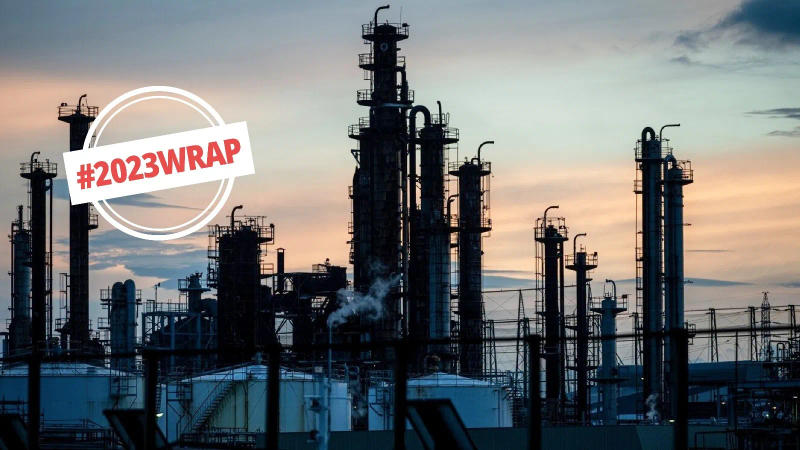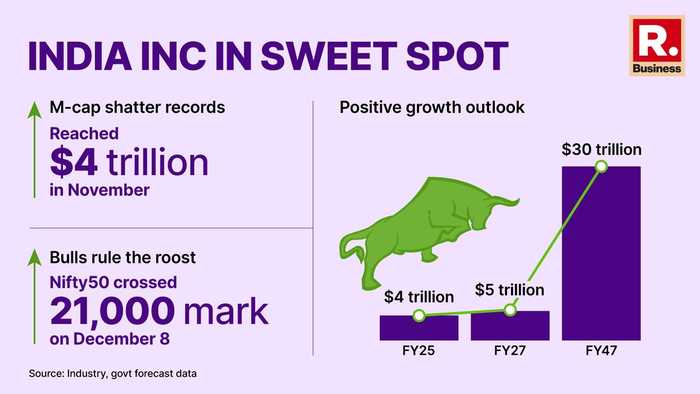Published 13:51 IST, December 18th 2023
Growth-driven Capex thrust to ring in new fiscal for India, say industry captains
Economy to rejuvenate growth barometer with the help of manufacturing, services sector, and industry-friendly taxation policies.

While country's economy exhibited an impressive growth, during second quarter of the ongoing fiscal, surging at 7.6 per cent, securing a position as the fastest-growing major economy, the Reserve Bank of India's (RBI) revised growth forecast of 7 per cent for FY24, has set ambitious growth targets for the next financial year (FY25) as well. This resurgence, propelled by robust performances in manufacturing, mining, and services, saw a 13.9 per cent Gross Value Added (GVA) surge in the manufacturing sector, meeting heightened pre-festival demand.
Several captains of India Inc, speaking exclusively to Republic Business, said they are bullish on the growth driven by a capex push in the upcoming financial year. In the country's growth story, auto sector’s importance is gauged by the fact that it contributes 7.1 per cent to the overall GDP and 49 per cent to the manufacturing GDP while generating about 4 crore direct and indirect employment.

Maruti Suzuki India Limited (MSIL), country's leading car maker by numbers, registered an increase of 80.3 per cent in net profit, during the September quarter this fiscal, with Suzuki Motor Gujarat Private Limited (SMG), a wholly owned subsidiary of Maruti Suzuki, surpassing the milestone of 3 million cumulative production. MSIL is further enhancing its production flexibility, Hisashi Takeuchi, Managing Director & CEO, Maruti Suzuki India Limited has said.
Speaking exclusively to Republic Business, Shashank Srivastava, Senior Executive Officer, Marketing & Sales, MSIL said it has a bullish view of the Indian industry’s future. “There is a significantly high correlation between GDP per capita growth and the automotive industry volumes. With growth figures revision upwards it augurs well for the manufacturing sector, which is about 17 per cent of the economy and especially automotive, which is 7.5% of GDP and about 45 per cent of manufacturing. The positive forecasts for the auto industry going forward will certainly lead to higher capex," says Srivastava.
Puneet Anand, AVP & Vertical Head - Corporate Affairs, Hyundai Motor India Ltd told Republic Business that the recent announcement by the RBI on the revised growth for the current fiscal year has instilled confidence in the market. He said the automotive industry, being a key contributor to the manufacturing sector, has shown remarkable strength and potential. We are optimistic about the role our industry plays in driving economic recovery.
"At Hyundai Motor India, we view the robust growth in the manufacturing sector, especially in automotive, as a testament to the resilience and adaptability of the Indian economy. As a company, Hyundai Motor India has recently announced an investment of Rs 20,000 crore and always been dedicated to investing in cutting-edge technology including safety and green cars, innovative research and development, and enhancing our manufacturing capabilities. We believe that continued investments in these areas will not only strengthen our market presence but also contribute significantly to the overall economic growth. As a leading player in the automotive industry, we remain committed to provide mobility solutions that align with the evolving needs of the market," Anand said.
REC, a 'Maharatna' company under the Ministry of Power, also registered with the RBI as a Non-Banking Finance Company (NBFC),Public Financial Institution (PFI) and Infrastructure Financing Company (IFC),in its operations during Q2 of FY24, set a record of highest-ever sanctions of Rs 1,04,366 crore and disbursements of Rs 41,598 crore.
TSC Bosh, ED (BDM and I&L), REC told Republic Business that in a commitment to sustainable future, REC is keen in contributing to country's energy landscape. "REC demonstrates unwavering support for green initiatives with the renewable sector comprising a substantial 24 per cent (Rs 24,994 crore) of the overall sanctions. As a strategic partner to the Government of India’s Energy Transition Goals, REC’s financial contributions play pivotal role towards achieving 500 GW installed Renewable Energy capacity by 2030," Bosh said.
He said through supplementary energy transition process, REC has set an ambitious target of creating loan assets of Rs 3 lakh crore by 2030, which is almost ten-fold of the present RE portfolio of REC exemplifying its vision for a cleaner and greener India. "Many successful MoUs under renewable segment signed during the G20 Summit, totalling to around ?2.86 lakh crore, further underscore REC's leadership in driving India's journey towards a sustainable and eco-friendly future," Bosh added.
This growth momentum, as per Shailesh K Pathak, Secretary General, FICCI, is an outcome of Government of India and the domestic businesses working together for developing the country's economy. "Our manufacturing sector would need to grow from 16-17 per cent of GDP to 25 per cent by 2047, which is a 15X growth," Pathak said. In terms of the fiscal momentum, FY23 witnessed an unprecedented 22.9 per cent surge in government capex, reaching Rs 13.3 trillion, signaling a robust impetus that fueled renewed private capex optimism. The stock market in November, achieved a milestone, touching $4 trillion in market capitalisation for the first time ever. This coincided with the NSE barometer Nifty50 reclaiming the psychological mark of 20,000 for the first time since September and now crossing the 21,000 mark.
Krishnan Akhileswaran, Chief Financial Officer, Apollo Hospitals said a capex increase aided by good government policies typically has a multiplier effect on the GDP of the economy as also job growth. "The centers capex has steadily been increasing from 1.7% of GDP to over 4.5% in the last Union budget and this definitely should enable GDP growth at 7% now and if enabled further with lower tax rates , more flexible labour policies and GST harmonisation should foster even higher growths," he said.
Going forward, corporate India is optimistic of the robust manufacturing activity to spur growth and subsequently market-cap. There also has been a surge in corporate investment of late as businesses shifted focus from 'maintenance capex' to 'discretionary capex,' resulting in a substantial 21 per cent year-on-year increase, totaling ?7.6 trillion in FY23. The financial sector resilience in India's financial landscape exhibited a sturdy 15.6 per cent credit growth in May 2023, empowered by substantial reserves in domestic banks, propelling businesses towards a significant expansion. India is the 3rd largest auto market globally and auto sector plays a critical role in India's shift to green energy.
While the Economic Survey, 2023 reaffirmed that the EV industry, will create 5 crore direct and indirect jobs by 2030, sustainability vis-a-vis energy has been the key focus area of India's growth story. Prime Minister Narendra Modi, during the recent 63rd SIAM Annual Convention, had underlined that auto sector will be the key driver of India's growth from fifth to third-largest world economy. The PM had also highlighted country's efforts to provide a boost to the power sector. In line with the robust growth, industry body PHD Chamber of Commerce and Industry (PHDCCI) forecasts country's continued economic prowess, projecting a $4 trillion economy by 2024-25.The country's resilience and recovery, outshining other major economies, positions it for continued growth, with an estimated 6.1 per cent growth rate over the next five years, surpassing China's expected performance, the PHDCCI forecast has added.
Updated 14:15 IST, December 18th 2023




